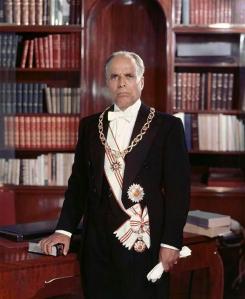My new apartment in Monastir, Tunisia overlooks the Mediterranean Sea, but that’s not all. It also overlooks the mausoleum of ex-president (and socialist dictator) Habib Bourguiba. Every morning, when I take my coffee out onto the balcony and bask in the sunlight as it reflects joyously off the rippling sea waves, I stare out at the palace-like structure. I began to wonder about who this Bourguiba actually was. So I looked him up, and this is what I discovered.

Habib Ben Ali Bourguiba served as the country’s first president following their independence in 1956, himself proclaiming the Kingdom a Republic the following year (1957). After the nation’s separation from France, he earned the title “Supreme Combatant” (whatever that means). He was born and spent his childhood in Monastir (hence why he’s buried outside my window), and you can eat in a restaurant in a building that he previously called home.
His rise to power isn’t that interesting at all. He was a statesman during the time of French occupation, but quickly became a socialist and ruled for about 30 years as dictator (for lack of a better word). He was ousted in a coup de’tat by prime minister, a man named Zine El Abidine Ben Ali in 1987 because of his declining health, the rise of Islamism, and a War of succession. Basically, he came into power via bloodshed and turmoil and he left in the same manner.
What makes this story slightly more interesting is that his successor, this Ben Ali, was the leader until the Tunisian Revolution in 2011, also known as the Jasmine Revolution. At that point, he was ousted and now lives with his family in exile in Saudi Arabia. If he comes back into Tunisia, he’ll be executed on the tarmac. What is it about this country that causes leaders to be so violently overthrown, just about all the damn time? He is accused of a variety of crimes like manslaughter and drug trafficking.

For those of you who don’t know, the revolution here wasn’t much more than a campaign of civil disobedience (thank you Dr. King) and street protests. The country has since become democratized (mostly successfully), which means that the general public and the media now enjoy freedom of speech – no small feat for an Islamic nation. But that’s about all that changed. From what other Tunisians have told me, there are other aspects of life which have gotten worse in the past six or so years, including unemployment, the value of the dinar (their currency), and trash or garbage, which litters just about every street in every city that we’ve seen – even our beautiful Monastir (and don’t get me started on the way it smells when the wind blows a certain direction).

Many analysts agree that the revolution here could very well pave the way toward freedom in all other Arab countries. Although other Arab Spring nations have failed to convert to constitutional democracies thus far, there may still yet be time for them to fall like dominoes. Fighting in Egypt resulted in a regime change (when the Muslim Brotherhood was taken down by General Sisi, who went on to win a general election to become president himself) as well as the current civil war in Syria may yet go either way. Many other conflicts are still on-going and have been given the name The Arab Winter. For Tunisians, however, the winter and spring are over and the time for summer seems at hand.
Until Next Time…
-Justin
Very interesting article. It’s a shame the citizens don’t care enough to clean up and make the country appealing for tourists.
Setting up a democracy oftentimes requires people who are willing to compromise. The very nature of many similar countries is that those in power want no compromise (what’s in it for them). So it’s hard to enact change. Syria is a perfect example where it is taking a civil war and still the leader is in control with an iron fist. People who want to change through a revolution have to be prepared for the ultimate sacrifice. I’m not sure Americans today would be willing to endure what our founding fathers did in order to bring the republic to fruition.